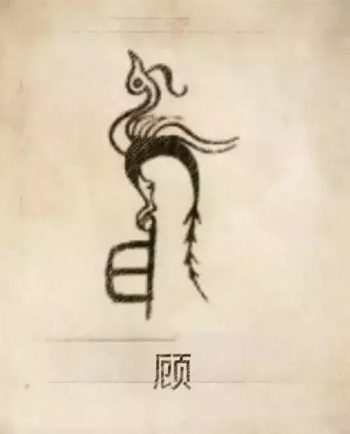The Gu(gù) surname holds a special place in Chinese history and culture, representing a lineage that has endured for thousands of years. Today, let’s explore the origins of the Gu family, meet some of its most notable figures, and understand its cultural significance and societal impact. Whether you're a history enthusiast or simply curious about Chinese heritage, this journey through the Gu surname will have a clear understanding into one of China’s most influential clans.

Ⅰ、The Origins of the Gu Surname
1. Descendants of the ancient Xia and Shang kingdoms
During the Xia Dynasty (2070–1600 BCE), a branch of the Kunwu clan, descendants of the legendary Emperor Zhuanxu, was granted the territory of Gu (located in present-day Fan County, Henan Province). After the fall of the Xia Dynasty, the people of Gu adopted the name of their state as their surname, becoming the earliest bearers of the Gu name.
2. The Bloodline continuation of King Goujian of Yue
During the early Han Dynasty (206 BCE–220 CE), Yao, a 13th-generation descendant of King Goujian of Yue, was enfeoffed as the King of Donghai for his contributions to the Han Empire. His son was granted the title "Marquis of Guyu" and settled in Kuaiji (modern-day Suzhou, Jiangsu Province). His descendants later adopted "Gu" as their surname, forming another branch of the Gu family.
Ⅱ、Notable Figures in Gu Family History
1. Artistic Masters
Gu Kaizhi: A legendary painter of the Eastern Jin Dynasty, Gu Kaizhi is celebrated for his theory of "using form to convey spirit," which became a cornerstone of Chinese art.
Gu Hongzhong : A master painter of the Southern Tang Dynasty, his work <The Night Revels of Han Xizai> is considered one of the greatest achievements in Chinese figure painting.
2. Scholarly Giants
Gu Yanwu: A prominent thinker of the late Ming and early Qing dynasties, Gu Yanwu is best known for his declaration, "The rise and fall of the nation is the responsibility of every citizen." His work <Ri Zhi Lu> laid the foundation for Qing Dynasty empirical studies.
Gu Zuyu: A geographer and historian, Gu spent over 30 years compiling <Du Shi Fang Yu Ji Yao>, a masterpiece of military geography.
3. Political and Military Leaders
Gu Yong: A chancellor of the Eastern Wu during the Three Kingdoms period, Gu Yong played a pivotal role in stabilizing the southern regime.
Gu Rong: A leader of the southern gentry, Gu Rong facilitated the relocation of the Jin Dynasty to the south, shaping the political landscape of the Northern and Southern Dynasties.
Ⅲ、Cultural Significance
1. Ancestral Heritage and Clan Culture
The Gu surname ancestral homes in Kuaiji (modern-day Shaoxing) and Wuling (modern-day Changde) are central to its identity. Over 100 genealogical records, such as the Wuling Gu Clan Genealogy, document the family’s history. The clan’s motto, "Wuling’s Legacy, Scholarly Reputation," reflects its emphasis on education and moral integrity.
2. Philosophical Contributions
Gu Yanwu’s philosophy of "applying knowledge to practical use" continues to inspire Chinese intellectuals. The Gu surname teachings, encapsulated in the maxim "Act with integrity, seek knowledge through learning," have fostered a tradition of ethical conduct and scholarly pursuit.
Ⅳ、Societal Impact
1. Shaping Regional Culture
As one of the "Four Great Clans of Wu," the Gu surname contributed to the economic and cultural development of the Jiangnan region (southern China). Historical sites associated with the Gu family can still be found in Shaoxing and Suzhou.
2.Modern Contributions
In contemporary times, the Gu surname has produced distinguished figures such as atmospheric physicist Gu Zhenchao and pianist Gu Shengying, showcasing the family’s adaptability and diverse talents. Today, the Gu surname is most concentrated in Jiangsu, Zhejiang, and Shanghai, home to 70% of China’s Gu population.
Conclusion
The Gu surname millennia-long journey is a microcosm of Chinese history, reflecting the interplay between northern and southern cultures and the evolution of scholarly and ethical traditions. From the ancient state of Gu to the artistic brilliance of Gu Kaizhi and the intellectual legacy of Gu Yanwu, the Gu surname’s story offers a unique lens through which to understand China’s rich cultural heritage.